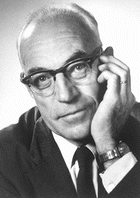John C. Eccles
Biography of John Carew Eccles
 John
Carew Eccles was born in Melbourne,
Australia, on January 27th, 1903. He owes much to
his early training by his father, William James
Eccles, who was a teacher as also was his mother,
née Mary Carew. He was awarded an Oxford D.
Phil. degree in 1929 for a thesis on Excitation
and Inhibition. During this Oxford period
research was largely on synaptic transmission
both in the central nervous system and
peripherally in sympathetic ganglia, smooth and
cardiac muscle. Using the newly developed
techniques of electrophysiology - amplifiers and
cathode ray oscilloscopes. John
Carew Eccles was born in Melbourne,
Australia, on January 27th, 1903. He owes much to
his early training by his father, William James
Eccles, who was a teacher as also was his mother,
née Mary Carew. He was awarded an Oxford D.
Phil. degree in 1929 for a thesis on Excitation
and Inhibition. During this Oxford period
research was largely on synaptic transmission
both in the central nervous system and
peripherally in sympathetic ganglia, smooth and
cardiac muscle. Using the newly developed
techniques of electrophysiology - amplifiers and
cathode ray oscilloscopes.
In addition to this purely scientific study of
the brain, Eccles has followed Sherrington in
developing a philosophy of the human person that
is consonant with the whole of brain science.
Various aspects of this philosophy were developed
in lectures and broadcast talks, and recently the
whole of Eccles' philosophical thought has been
brought together in a book entitled Facing
Reality published by Springer in the
Heidelberg Science Library (1970). Dr Eccles
died in 1997.
http://www.nobel.se/laureates/medicine-1963-1-bio.html
Eccles, John Carew- Biographical entry
Eccles was Professor of Physiology
and Biophysics at the State University of New
York, Buffalo 1968-75. Earlier he was Professor
of Physiology at the Australian National
University 1951-66 and was awarded the Nobel
Prize for medicine in 1963 (jointly).
http://www.asap.unimelb.edu.au/bsparcs/biogs/P000382b.htm
John Eccles on Mind and Brain\ by David
Pratt
David Pratt
According to the prevailing
scientific theory of the mind -- known as
"identity theory" -- mental states are
identical with physicochemical states of the
brain. The brain is regarded as a supercomplex
computer in which material processes in the
cerebral cortex somehow generate thoughts and
feelings. Over the course of several decades,
partly in collaboration with the philosopher of
science Sir Karl Popper, Eccles has developed an
alternative theory of the mind, known as
dualist-interactionism. His basic philosophical
starting point is one with which theosophists can
wholeheartedly agree:
I maintain that the human
mystery is incredibly demeaned by scientific
reductionism, with its claim in promissory
materialism to account eventually for all of
the spiritual world in terms of patterns of
neuronal activity. This belief must be
classed as a superstition. . . . we have to
recognize that we are spiritual beings with
souls existing in a spiritual world as well
as material beings with bodies and brains
existing in a material world. --Evolution
of the Brain, Creation of the Self, p.
241
http://www.theosophy-nw.org/theosnw/science/prat-bra.htm
Memories of Sir John Eccles
Donald E. Watson
I met Sir John only once, but I've
felt close to him for decades. In 1960, as a
postdoctoral fellow in neurophysiology, I first
read his classical book, The Physiology of
Nerve Cells. Appreciating the intellect and
imagination of its author, I adopted him as a
role model—like a father.
http://sunflower.com/~dewatson/$eccles.html
Review of "Evolution of the Brain":
Creation of the Self\ by John Eccles
Selmer Bringsjord and
Joseph A. Daraio
I believe that biological evolution
is not simply chance and necessity. That could
never have produced us with our values. I can
sense with [Sherrington] that evolution may be
the instrument of a Purpose, lifting it beyond
chance and necessity at least in the
transcendence that brought forth human creatures
gifted with self-consciousness (Eccles, 1989, p.
116).
http://psyche.cs.monash.edu.au/v5/psyche-5-10-bringsjord.html
|



